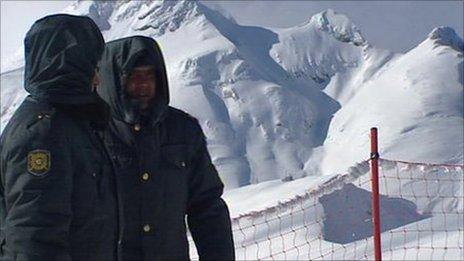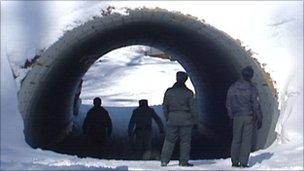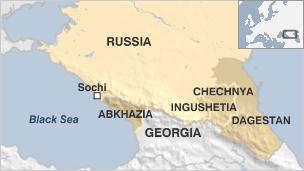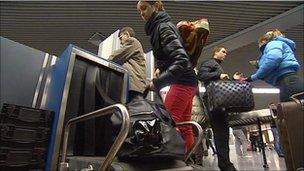Sochi 2014: Russia's Olympic security concerns
- Published

Sochi is close to the North Caucasus and right next to Abkhazia
On the shores of the Black Sea, Russia's Olympic dream is slowly taking shape.
On a giant construction site, an ice hockey stadium is being bolted together; there's a skating arena shrouded in scaffolding, and the wasteland in front of me will soon be a curling centre.
This is Sochi - venue for the 2014 Winter Games. There is still plenty to be built. But it is not the sporting facilities that is Russia's biggest concern right now - it is security.
At one of the checkpoints, a scanning machine resembling a car wash passes over a lorry delivering building materials. It is searching for traces of explosive.
The head of Russia's Internal Security Service, the FSB, has already warned that terrorists are planning to target the Sochi Olympics.
There is heightened concern following last month's suicide bombing at Moscow's Domodedovo airport.
The attacker came from the North Caucasus where Russia is battling an Islamist insurgency. Sochi is right on the doorstep of this volatile region.
"Terrorist attacks in the North Caucasus have an international connection," believes Russia's Deputy Prime Minister Dmitry Kozak.
"Al Qaeda and Arab terrorists are involved. And our secret services have uncovered plans for more attacks. We expect terrorist activity to increase the closer we get to the Sochi Olympics. That's because the terrorists want to attract as much international attention as they possibly can."
At the Olympic CCTV control centre, the guards are on alert. On one of the screens they have spotted an intruder near the perimeter fence. A security team is despatched to the scene but this is no terrorist threat.

The local governor has openly criticised Olympic security
"So far the people we've detained on site have not had any terrorist intentions," says Nikolai Gryznov, Vice President of Olympstroi, the company building and guarding the Olympic facilities.
"Most of these individuals have just been trying to steal things. But the fact that we can catch them shows that we will be able to detain anyone with more dangerous intentions."
He believes the security system is well organised as some of the people detained have been found on police wanted lists.
Restive Caucasus
But not everyone is so confident. Earlier this month, the governor of Krasnodar region, of which Sochi is a part, openly criticised Olympic security.
He complained that some people involved in Olympic construction did not see anti-terrorist measures as a priority.

He threatened construction companies with legal action.
Politicians can order tighter security. But what they cannot do is change geography.
Not only is Sochi close to the restive North Caucasus. It is also right next to Abkhazia, the republic that broke away from Georgia and is a source of constant tension between Tbilisi and Moscow.
"The North Caucasus is a theatre of military actions, of fighting, of conflict," says former KGB colonel Oleg Nechiporenko who was in charge of security for the Soviet delegation at the Mexico Olympics in 1968. "I hope that they take all necessary measures for the protection of this event."
Steve Rosenberg reports on security at Sochi for the Winter Olympics
'Passenger profiling'
Security has also been tightened at Sochi International Airport. Everyone is screened as they enter the terminal building. Later this year the airport will introduce Israeli-style "passenger profiling" to help identify potential terrorists.
"No system of security provides 100% protection from attack," says Sergei Likharev, chief executive of the company Basel Aero which manages several airports in southern Russia, including Sochi.
"This has been proven in Israel, in the United States and in Europe. You cannot provide zero percent probability of somebody crazy blowing themselves up. The goal is to decrease this risk to the appropriate level."

The Russian government has denied reports of a $2bn security bill
Mr Likharev says security is not just down to airport staff or governments but to ordinary people watching out for abandoned luggage or individuals acting suspiciously.
The Russian authorities haven't revealed how much they are spending on Olympic security: the figure is a state secret.
Some reports in the Russia media have suggested the total cost will be around $2bn, although Vice Premier Dmitry Kozak says that figure is inflated.
As for the International Olympic Committee, it says it still has no doubt that Russia will organise a safe winter Games.
Russia's government is confident that it can. But the authorities here are bracing themselves for more attacks in the next three years. The 2014 Olympics mean so much to Russia, for national prestige.
That is why they are a prime target for terror.
- Published9 February 2011
- Published25 January 2011